Indigenous chief Merong Kamakã Mongoió, who was found dead in Brumadinho, Minas Gerais, on Monday morning (March 4), was the leader of the indigenous people who had been living on land owned by mining company Vale for over two years. Previously, they were scattered in urban areas of surrounding towns. The group settled in October 2021 as part of a movement to retake the village.
The Kamakã Mongoiós are a family of the Pataxó-hã-hã-hãe people, whose mother village is located on the southern coast of Bahia state, at the foot of the Pascoal mount. A video posted on social media by the National Indigenous Union (UNI) in March 2022 shows the progress of their work in Brumadinho.
In the video, Merong explains that the retaking efforts had brought Kamakã Mongoiós from Bahia over the course of more than 40 years of conflict to live in urban settings, often in a precarious situation and without access to rights that should be guaranteed to indigenous peoples.
“During the COVID-19 pandemic, we demanded a guarantee of vaccines and food, and we were denied this right. So we asked the Great Spirit to guide us, and we arrived here in this territory, which was abandoned and had a spring. Some time later we discovered it belongs to Vale.
“It may be the case on paper, but the company doesn’t live here. This land is meant for us to live and plant on, and for our children to bathe in the river and get a special education. This is not just our fight. We want to protect the springs. We want to protect the territories from mining craters.”
Another video shows a ceremony held to symbolically demarcate the land. In this recording, the indigenous people appear installing a plaque naming the territory Kamakã Mongoiõ Village. “Our bodies may even serve as fertilizer for this land, but we are not leaving,” Merong said on the occasion.
The mining giant said the area is intended for environmental recovery and has come under a legal dispute. “Vale regrets the death of chief Merong and stands in solidarity with his family and the indigenous community,” the text states.
The property is in a region known as Vale do Córrego de Areias. The site is approximately 20 kilometers from the Córrego do Feijão mine, where a dam ruptured and claimed 270 lives in 2019. Among those affected by the episode is another Pataxó-hã-hã-hãe village. Located on the banks of the Paraopeba river, it was divided after the tragedy and many families ended up leaving.
Merong’s body showed signs of hanging. Born in Contagem, Minas Gerais, he was 36 years old. The Military Police were called to the scene and filed a suicide report, but people close to the chief challenge this hypothesis.
“Chief Merong was murdered. They faked suicide, but it wasn’t suicide. Merong talked to me in private for 30 minutes on February 25. He had many plans to expand our fight,” Friar Gilvander Moreira, a member of the Pastoral Land Commission (CPT) and a friend of the chief, wrote on social media.
The Civil Police said that “no line of investigation has been ruled out” for the time being The Federal Police confirmed they are also taking part in the investigation. Their mobilization is warranted because, if Merong was indeed the victim of a crime, the jurisdiction to judge the case will have to be fixed taking into account the motives at play.
A previous decision by the Superior Court of Justice establishes that homicides involving indigenous people are discussed at state level. However, according to the Constitution, federal courts should be responsible if the crime is linked to a dispute or conflict over indigenous rights.
The indigenous leader’s death was mourned in a statement issued by national indigenous authority Funai. On her social networks, indigenous federal representative Célia Xakriabá, of the PSOL, posted a message about what had happened.
“Merong will live on in our hearts and in our fight, because the fight is all we inherit,” she wrote. Expressions of mourning were also published by various nonprofits, such as the National Confederation of Family Farmers and Family Entrepreneurs of Brazil (Conafer) and the Indigenous Missionary Council (Cimi).
“Despite the indications of suicide, relatives and friends are raising the suspicion of a possible murder. All possibilities need to be investigated rigorously and seriously by the public authorities. [Nonetheless,] indigenous suicides must also be seen as a process of violence against native peoples as a project of extermination,” the text released by Cimi reads.
Chief Merong belonged to the sixth generation of the Kamakã Mongoió family and spent part of his childhood in the south of Bahia. An activist, he was involved in mobilizations in various parts of Brazil and offered support to Kaingáng, Xoklengx, and Guarani groups. He was enthusiastic about reclaiming territories, believing it to be a fundamental form of resistance against the erasure of indigenous peoples.
The Pataxó-hã-hã-hãe people have been the victims of several violent actions in recent years. In December last year, chief Lucas Kariri-Sapuyá, 31, was executed in a hideout in southern Bahia.
The same happened to shaman Nega Pataxó, murdered by farmers in January this year, also on Bahian soil. Galdino, the indigenous victim of a barbaric crime that shocked Brazil in 1997, was also from the Pataxó-hã-hã-hãe people: he was burned alive in Brasília by elite youths.
ABr














